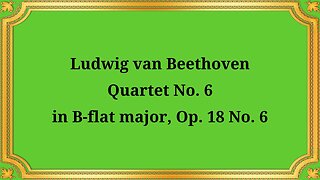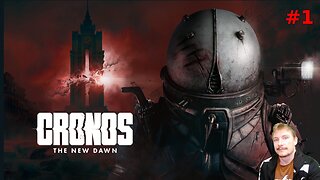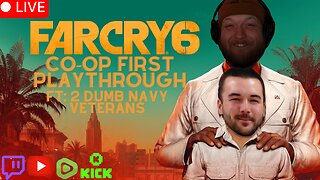Premium Only Content

Famous Overtures (1951)
#Beethoven #CoriolanOverture #Mendelssohn #RuyBlasOverture #EgmontOverture #ClassicalMusic #MusicalComposition #Overture #MusicHistory #Composer
Publication date 1951
Tonkünstler Orchestra
1. Ludwig van Beethoven Coriolan Overture
HANS WOLF, Conductor
2. Felix Mendelssohn Ruy Blas Overture
GEORGE SINGER, Conductor
3. Ludwig van Beethoven's Egmont Overture
HANS WOLF, Conductor
Overtures hold a special place in the world of classical music, often serving as an introduction to larger compositions or as standalone pieces. Will delve into the captivating musical works of Ludwig van Beethoven's Coriolan and Egmont Overtures, as well as Felix Mendelssohn's Ruy Blas Overture. These compositions showcase the brilliance and innovation of renowned composers, leaving an indelible mark on the history of classical music.
1. Ludwig van Beethoven's Coriolan Overture
Composed in 1807, Beethoven's Coriolan Overture is a musical interpretation of Heinrich Joseph von Collin's tragic play "Coriolan." The overture sets the stage for the dramatic conflict and emotional intensity of the storyline. Through its brooding and intense melodies, Beethoven captures the internal struggle of the protagonist, Coriolanus, and the tragic events that unfold. The use of contrasting themes, dynamic shifts, and powerful orchestration exemplify Beethoven's ability to convey deep emotional turmoil.
2. Felix Mendelssohn's Ruy Blas Overture
Mendelssohn's Ruy Blas Overture, composed in 1839, draws inspiration from Victor Hugo's play "Ruy Blas." This overture showcases Mendelssohn's gift for melodic invention and orchestration. The piece begins with a majestic and heroic theme, which evolves into an energetic and lively section, reflecting the play's vibrant atmosphere. Mendelssohn's use of rich harmonies, intricate counterpoint, and rhythmic drive demonstrates his mastery of orchestral composition, leaving the audience captivated from start to finish.
3. Ludwig van Beethoven's Egmont Overture
The Egmont Overture, composed in 1810, was written as part of the incidental music for Johann Wolfgang von Goethe's play "Egmont." Beethoven's overture encapsulates the struggles for freedom and heroism depicted in the play. The piece begins with a somber and melancholic theme, symbolizing the oppression faced by the Dutch hero, Count Egmont. As the overture progresses, it transforms into a triumphant and uplifting section, representing Egmont's bravery and eventual victory. Beethoven's powerful orchestration, dynamic contrasts, and evocative melodies make the Egmont Overture a truly iconic composition.
The Coriolan Overture, Ruy Blas Overture, and Egmont Overture stand as testament to the genius of Beethoven and Mendelssohn in their ability to create emotionally charged and musically captivating works. These overtures not only serve as introductions to larger compositions but also stand on their own as powerful and evocative pieces of music. Through their innovative use of orchestration, melodic invention, and dynamic contrasts, these compositions continue to inspire and captivate audiences, leaving an enduring legacy in the world of classical music.
You have the opportunity to support the channel:
https://destream.net/live/RadSiarAl/donate
https://www.buymeacoffee.com/6355radsiaral
-
 22:54
22:54
Classical music_Music Inspiration
12 days agoLudwig van Beethoven Quartet No. 6 in B-flat major, Op. 18 No. 6
302 -
 LIVE
LIVE
Flex011
4 hours ago $0.03 earnedCronos: The New Dawn – Brutal Time-Travel Horror Survival
36 watching -
 33:11
33:11
The Finance Hub
15 hours agoBREAKING: JD VANCE JUST RELEASED A MASSIVE BOMBSHELL!!! OMG!!
2088 -
 18:06
18:06
Professor Gerdes Explains 🇺🇦
14 hours agoAfter Major Attack, Trump Vows "Phase II" Sanctions on Russia
314 -
 LIVE
LIVE
EVASIVE_rabbi
4 hours ago✅️ 2 Dumb Navy Vets & A First Playthrough #Coop ✅️
67 watching -
 LIVE
LIVE
Cook14u
8 hours agoSeahawks Let Me Down, DO NOT Talk About How I Look 🤐🙃🥴
14 watching -
 8:18
8:18
MattMorseTV
14 hours ago $8.16 earned2.2 MILLION in ONE YEAR.
60.7K144 -
 LIVE
LIVE
TheKappaConvict
1 hour agoRainbow Six Siege X Lets send Em Packing Boys | The kappa Convict
7 watching -
 1:05:18
1:05:18
Steve-O's Wild Ride! Podcast
3 days ago $5.27 earnedYUNGBLUD Stands Up For His Generation | Wild Ride #265
51.8K14 -
 12:11
12:11
Nikko Ortiz
2 days agoCrashout 6 Rumble
88.1K9